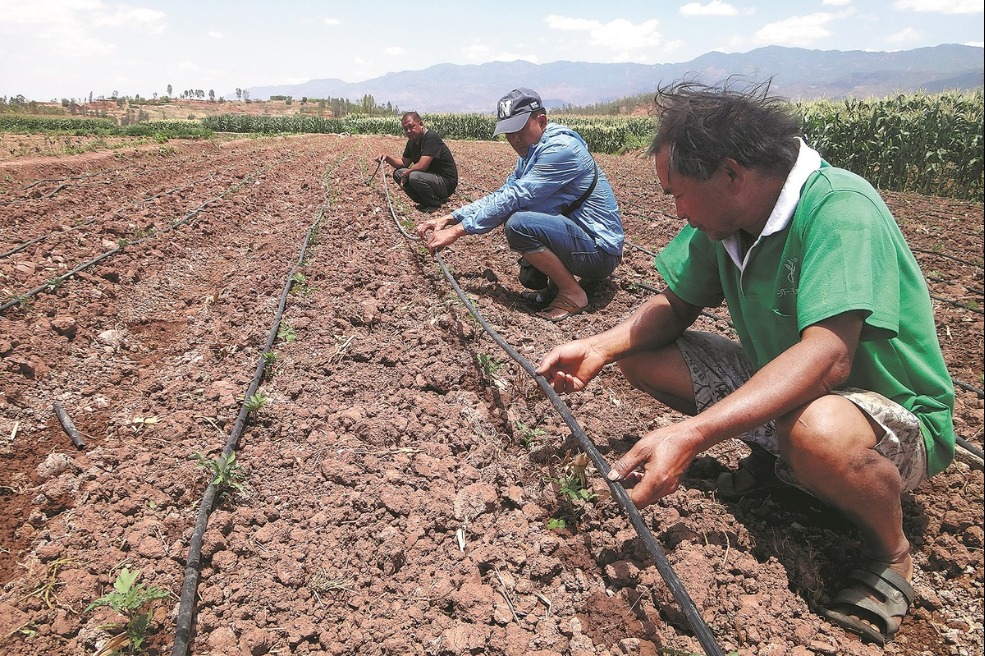Daring to make the sun and moon shine in new skies


Today’s generation needs to follow the example set by revolutionary martyrs
In 1959, Chairman Mao Zedong wrote his well-known poem Shaoshan Revisited which reads:
Like a dim dream recalled, I curse the long-fled past--
My native soil two and thirty years go by.
The red flags rouse the serf, halberd in hand,
While the despot’s black talons held his whip aloft.
Our minds grow stronger for the martyrs’ sacrifice
Which dares to make sun and moon shine in new skies.
Happy, I see wave upon wave of paddy and beans,
And all around heroes home -bound in the evening mist.
The poem reflects the strong conviction of those revolutionaries who had devoted themselves to China’s revolutionary cause without consideration of their own interests. It also reflects their courage to make brave sacrifices to change the old society into a new world for the sake of the welfare and happiness of people. This poem serves as a strong expression of the common thoughts and feelings that every revolutionary in that era had kept deep in their minds.
In June 1959, Chairman Mao returned to his hometown, Shaoshan village, after 32 years of absence. It was also his first time to return to his hometown after the founding of the People’s Republic of China. At that time, our country had completed the socialist transformation and established the socialist system. Upon seeing people in his hometown leading a rather harmonious and happy life, Chairman Mao felt so satisfied and pleased that he wrote the poem Shaoshan Revisited to express his feelings.
But when he reflected on the hard times of the recent past, his heart grew heavy. While he was away for 32 years, both his parents passed away and six other relatives, including his wife and his eldest son, had sacrificed much to ensure victory. In 1925, Chairman Mao and his wife Yang Kaihui came to Shaoshan village, where they established a night school for peasants to spread revolutionary ideology and to train the backbone of the movement. Before long, the Shaoshan Special Party Branch of the CPC was set up. It was one of the earliest Party branches in Hunan province. With this organization giving momentum, the local Peasant Movement began developing rapidly.
In 1927, Chairman Mao went home again. At that time, he was writing The Report on an Investigation of the Peasant Movement in Hunan Province, which deeply influenced the Chinese revolution. During the preparation of the report, he gained a clear understanding of the local peasants’ life by visiting their homes and talking with them about local conditions. Through these interviews and inspections, Chairman Mao became highly attuned to the social and legal issues of the time. That was his last time he went home before the founding of the PRC.
During the revolution struggle, many revolutionary pioneers appeared who were prominent talents of the age with admirable social status and used to living a prestigious life. But they resolutely cast off their comfortable life and plunged into the revolutionary cause of China. For their entire lifetime, they remained true to their original aspiration and keep their missions firmly in mind.
In the early 20th century, China was in a semi-colonial, semi-feudal society and suffered greater ravages than ever before. Since that time, the people’s liberation and national rejuvenation has become the greatest dream of the Chinese people and Chinese nation. The revolution of 1911 did not bring about the new hope for the people. After the revolution of 1911 failed, the country was dragged into the formation of divided states and involved in continuous wars between the new warlords. Some intellectuals were awakening and searching for the truth to save the fate of the Chinese nation and the Chinese people.
Li Dazhao was one such enlightened intellectual and was one of the founders of the CPC. During his study abroad in Japan in 1916, he was expelled by the university for participating in anti-Japanese activities. But he had no regrets. His expulsion was nothing compared to the national interests of China.
Li once worked at Peking University as a professor and librarian. While he increased his social status and income there, he never cared about such fame or wealth and would sacrifice both for the sake of revolution. As a pioneer of the New Culture Movement, he advocated for “democracy and science” and attacked old ethics and morals. He participated in discussions in the New Youth movement and became a principal contributor to it. Peking University thus became the main center of the New Culture Movement. Li Dazhao went on to study Marxism, which eventually replaced his previous beliefs.
In June 1920, Chen Duxiu decided to establish a communist party organization in Shanghai and consulted Li Dazhao about the name of the party. Li Dazhao suggested the organization be called the “Communist Party”. In October of the same year, the Beijing branch of the Communist Party was founded by Li, who served as its first secretary.
Since then, he remained loyal to the Party for the rest of his life. After his arrest by the reactionaries, Li kept the Party’s secrets and never surrendered. Even in the face of threats and intimidation by the reactionary warlords, Li maintained the Party line. In April 1927, he was killed and died a heroic death.
Before joining the revolution, many young students at that time embraced the ideal of saving the nation through science and technology. But the inability of a fractious and incompetent government to lead the country, and the encroachment of the imperialist aggressors from abroad, had taught them that there was no other choice but to take up the revolutionary struggle. They eventually adopted Marxism and dedicated themselves to a lofty revolutionary career.
One of these revolutionary youths was Xia Minghan. Xia came from a land-owning gentry family in Hengyang county, Hunan province. But instead of embracing his inherited privileges, he went to a new type of school, against his grandfather’s will, and participated in the patriotic student movement in 1919.
Thereafter, Xia worked as the head of the Organization Department of Hunan Provincial Party Committee and secretary of Changsha Municipal Party Committee. After the Counter-Revolutionary Coup on April 12, 1927, he decided to join the army and fight against KMT reactionaries. But in 1928, he was arrested by a reactionary traitor. The reactionaries were very angry with Xia Minghan because he refused to reveal any Party secrets, regardless of the cruel punishments they inflicted upon him. At his execution, when the executioner asked Xia Minghan whether he had any request, he let out a loud shout for a paper and a pen. Xia’s last act was writing the following heroic death poem: “Beheading is nothing to me as long as my doctrine is true. You kill Xia Minghan, but many will take my place”. Xia’s vow demonstrated the noble spirit of defending one’s communist belief with breath and blood.
Another revolutionary youth was He Long, one of the greatest militarists in Chinese history. His family tree was full of martyrs for the revolutionary cause, with 89 lives in total lost during the revolutionary struggles. Among them were his father, his younger brother and three sisters. From the Northern Expedition in 1924 to the founding of PRC in 1949, the number of people from his clan-family who had sacrificed for China’s revolutionary cause reached 2,050.
It is said that He Long started his revolutionary career by organizing a small group of armed forces with only “two kitchen knives.” He once followed Sun Yat-sen and became the corps commander. As time went on, He Long gradually lost faith in the KMT government. Their corruption and deviations from the revolution persuaded him to find common cause with the Communist Party of China. His faith had changed gradually from the Three Principles of KMT to communism. He refused resolutely Chiang Kai-shek’s bribe of high-rank and led his troops to participate in the Nanchang Uprising. He thereafter realized that the real revolutionary path could only be found by following the CPC. He became a CPC member in 1927. From then on, he devoted his entire life to the Party and people’s liberation cause.
During the revolutionary war, countless martyrs sacrificed their lives to fight for national sovereignty and liberation. According to incomplete statistics, there were more than 21 million martyrs across China, but only 3.7 million martyrs were recorded by name. The Xinguo county of Jiangxi province, for instance, has been named as The First County of Chinese martyrs. During the revolutionary period, among the county’s total population of 230,000, 93,000 people joined the Red Army. Out of those that enlisted, more than 50,000 died, with only 23,179 martyrs recorded by name. During the Long March of the Red Army, there were 12,038 sacrificed soldiers who came just from Xinguo county.
As Chairman Xi Jinping pointed out, “Over the past hundred years, the Party has united and led the Chinese people in writing the most magnificent chapter in the millennia-long history of the Chinese nation, embodying the dauntless spirits that Mao Zedong expressed when he wrote, ‘Our minds grow stronger for the martyrs’ sacrifice, daring to make the sun and the moon shine in the new sky.’ The great path we have forged, the great cause we have undertaken, and the great achievements we have made over the past century will go down in the annals of the history of the Chinese nation and of human civilization.”
“Daring to make the sun and the moon shine in the new sky” embodies our Party members’ spirits of fighting boldly and sacrificing fearlessly. It is their sacrifices that have brought about today’s prosperity.
The revolutionary martyrs have set a good example for today’s generation. In the new era, we must continue to develop the founding spirit of the Party and meet the various obstacles head-on. We must strive to make maximum contributions to building a strong country and rejuvenating the Chinese nation.
































